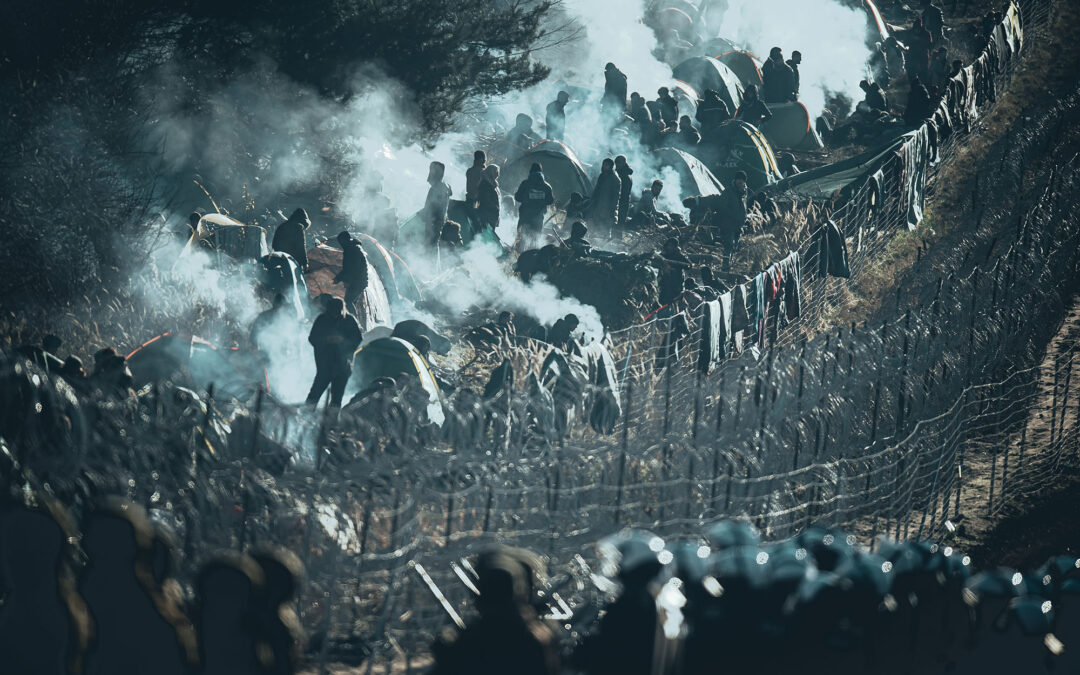Two large groups of people forced their way through the border into Poland from Belarus yesterday evening, according to police reports. Most of the people have now been detained.
Responding to the events, Poland’s defence minister said that “the modus operandi of those attacking the Polish border” had changed from “one large group” to “smaller, albeit numerous groups attacking the Polish border in parallel”.
On Wednesday morning, local police said the night was mostly “calm” around the area of the largest camp of around 800 people near Kuźnica Białostocka. However, two large groups had crossed the border and most migrants had been detained.
There were around 50 people in the first group, where 100 police officers were sent to support the border guard, and most had since been arrested, reported Onet.
Tens of thousands of people – mostly from the Middle East, Asia and Africa – have attempted to cross into Poland from Belarus this year. The crisis escalated on Monday when a large column of people – accompanied by the Belarus authorities – arrived at the border.
Some then unsuccessfully attempted to force their way through, before setting up camp. A Polish government spokesman called it “the most difficult situation since the beginning of the conflict on the border”.
Kolejna noc #naGranicy pic.twitter.com/9P1GLReji5
— podlaska Policja (@podlaskaPolicja) November 10, 2021
“It was not a calm night, indeed there were many attempts to break through the Polish border,” Błaszczak told Polskie Radio on Wednesday morning. But he said that all those who crossed had now been detained, according to reports from the army and border guard.
“The modus operandi of those attacking the Polish border is a little different now,” the defence minister said. “Whereas two days ago we had one large group near Kuźnica Białostocka trying to break through…we now have smaller, albeit numerous groups attacking the Polish border in parallel, in a few places.”
In a press conference today, Katarzyna Zdanowicz of the Podlasie province border guard said there were three attempts by groups to force their way across the border yesterday. One of them numbered around 200 people, but they had been sent back to Belarus.
Błaszczak confirmed that the number of soldiers on the border had been increased to 15,000 from 12,000 reported earlier this week. “If necessary, it could be increased further. The forces are prepared to take care of the security of our homeland,” he said.
The crisis on Poland’s border has sparked debate about how to involve organisations such as the EU and its border agency Frontex as well as NATO.
European Council President Charles Michel will meet Poland’s prime minister in Warsaw today, after saying that the EU must act decisively to resolve the border crisis.
Speaking in Berlin yesterdat, Michel said that the EU was “facing a brutal, hybrid attack” on its borders. He condemned Belarus’s “instrumentalisation of migrants for political purposes”.
“We have opened the debate on the EU financing of physical border infrastructure. This must be settled rapidly,” he said. “The borders of Poland and the Baltic states are the borders of the EU. One for all and all for one.”
Poland and 11 other member states urged the EU to help finance border-wall projects on the bloc’s external borders, but European Commission President Ursula von der Leyen has spoken against the idea. Manfred Weber, who heads the EPP Group in the European Parliament, has expressed his support for EU funding for a physical border.
The Polish government welcomed the news of Michel’s visit, said spokesman Piotr Müller, adding that the meeting would concern the security of the EU and the situation on Belarus’s borders with Poland, Lithuania and Latvia, which are “under a hybrid war attack”.
“It is an expression of a certain solidarity of the European Union,” Müller said, quoted by the Polish Press Agency (PAP).
Main image credit: Terytorialsi/Twitter

Ben Koschalka is a translator, lecturer, and senior editor at Notes from Poland. Originally from Britain, he has lived in Kraków since 2005.




















